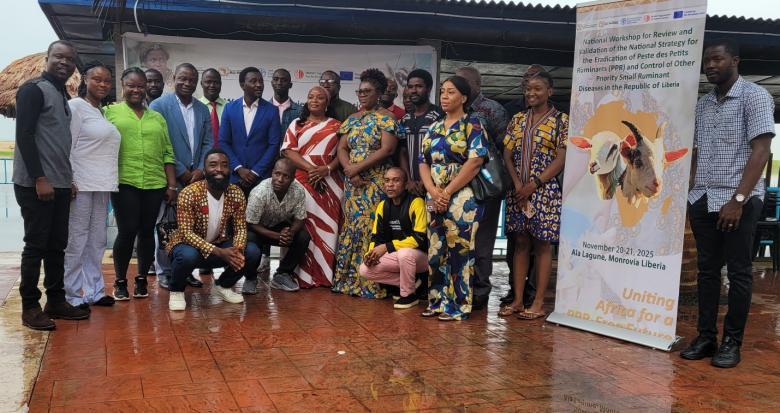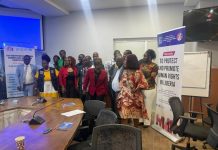Africa-Press – Liberia. The Regional Coordinator for Peste des Petits Ruminants (PPR) in West Africa, Dr. Perdita Hilary Lopes, believed that Liberia has the knowledge and regional backing needed to eliminate PPR by 2030, but this goal requires strong support from the government.
In a interview with FrontPageAfrica following a two-day workshop on Liberia’s strategy to combat PPR, Dr. Lopes pointed out that PPR, a disease affecting small ruminants like goats and sheep, is preventable and manageable, but igning it can be quite costly. She insisted that “the government must take the lead in this effort.”
Dr. Lopes urged the government to actively support veterinary services by creating supportive policies, providing financial resources, and bringing more attention to the fight against PPR. “If the government prioritizes this, they will get more people involved. We can eradicate PPR, but we need strong leadership from the government,” she said.
She also mentioned that Liberia should align its efforts with global and regional plans and create a clear action plan to tackle the disease. “Liberia is now aware of ongoing initiatives in the region and beyond,” she explained. “The country needs to match its strategy with these larger goals and set clear actions with timelines.”
According to Dr. Lopes, having a national strategy for PPR is not just a formality; it’s a crucial guide that outlines how the country intends to fight the disease.
“Every country in West Africa, including Liberia, needs to follow its national strategic plan, which explains the current situation with PPR, highlights areas of concern, and clarifies who is in charge of the eradication efforts,” she clarified. Countries must also work in harmony with their neigbouring countries.
The plan should detail specific actions, timelines, monitoring methods, and a realistic budget that aligns with international strategies, particularly those from the FAO and WOAH.
Despite the challenges Liberia faces, Dr. Lopes expressed hope due to the strong collaboration and engagement observed during the workshop. “Even in just two days, participants showed incredible teamwork and understanding of PPR’s impact,” she noted. “Liberia is active In regional initiatives.”
She emphasized that Liberia frequently participates in regional training sessions and meetings where countries share effective strategies and lessons learned.
When asked whether Liberia could meet the 2030 target despite ongoing funding issues, Dr. Lopes highlighted the need for a significant change in approach. “The PPR eradication program is part of a global movement, and PPR is a concern for the livelihoods of rural communities,” she explained.
Under global guidelines, countries are expected to fund at least 30% of their PPR eradication costs. “When a government invests 30% of the budget for eradication, it shows they care about supporting their own communities,” she added, which in turn can encourage external partners to help.
Dr. Lopes assured that PPR can be eliminated with simple vaccination methods. “It’s achievable to wipe out this disease with risk-based vaccination strategies,” she reiterated. “Doing nothing is not an option because PPR puts a heavy financial strain on communities.”
She warned that delaying action could harm nutrition, job opportunities for young people and women, and rural stability. “By eradicating PPR, our children will have access to more meat, and young people will have better chances to find work, women would have supplementary income,” she emphasized.
Additionally, she highlighted the vital roles of communities, especially women and youth, in this initiative. “It is crucial to involve women because keeping small livestock is an important investment for them,” she stated. “Youth are also essential as they can raise a few sheep and goats on their small farms. Their participation is key to eradicating PPR.”
Dr. Lopes stressed that the battle against PPR cannot be won by officials in Monrovia alone. Community members play an important role in assisting veterinary services by reporting any signs of the disease, such as runny noses, diarrhea, coughing, or sudden deaths in animals.
“Community involvement is essential. People need to understand the economic benefits of eradicating PPR and the social and economic risks of doing nothing,” she noted.
She also pointed out the need for community monitoring, given Liberia’s open borders. She urged farmers to stay alert. “If people from neighboring countries bring animals that show symptoms, and there are many sudden deaths, those in the community should quickly inform local surveillance officers,” she advised.
During her opening remarks, her Ecxellency, Madam Zogbo Luther-Goodridge, Assistant Minister for Technical Services at the Ministry of Agriculture, highlighted the government’s strong commitment to eliminating PPR, a disease that affects sheep and goats.
Goodridge encouraged veterinarians, field technicians, and other stakeholders in the livestock sector to see this strategy update as a joint effort that can significantly improve food security in Liberia.
She pointed out the ongoing difficulties in the country’s animal health situation, which makes small ruminants particularly at risk for new disease outbreaks.
Goodridge recalled a severe PPR outbreak in Nimba and Lofa Counties back in 2015, which sadly led to the deaths of more than 2,000 sheep and goats. This outbreak caused a serious setback for rural farmers who depend on these animals for both their income and nutrition.
“Many people’s livelihoods and food security were impacted, especially for farmers who rely on these animals,” she said.
Goodridge emphasized that women and children make up a significant portion—about 90%—of those working directly with small ruminants in remote areas.
“These people are extremely vulnerable to economic struggles and food shortages, so how well we manage PPR is crucial for their survival,” she noted.
While she agreed that vaccination is a key part of eradicating PPR, Goodridge stressed the need for Liberia to use more than just traditional methods.
“Vaccination is important, and spreading awareness is critical, but we also need to create early warning systems, strengthen monitoring and reporting from the field, and embrace new technologies that can help us at all levels,” she explained.
She expressed her gratitude to the Food and Agriculture Organization (FAO) for their support in logistics, finances, and expertise, which aligns with President Joseph Boakai’s agenda for inclusive development.
“It is essential that we all work together to tackle this issue and strengthen our national veterinary services to finally eradicate PPR from Liberia for good,” she declared.
In an interview with FrontPageAfrica, Patrick Fitzgerald Stepney, a technician from the Central Veterinary Epidemiology Unit, described the recent workshop as eye-opening, especially for young professionals in animal health.
“Right now, Liberia is at an early stage in combating PPR, which means there is still a lot of work to do to eliminate this disease affecting goats and sheep,” he explained.
He said that being part of this national effort has broadened his understanding of the disease’s impact and the steps needed to stop its spread throughout Liberia.
“It has been really meaningful. I’ve come to understand how the disease impacts farmers and how we can work together to get rid of it,” he added.
For More News And Analysis About Liberia Follow Africa-Press






